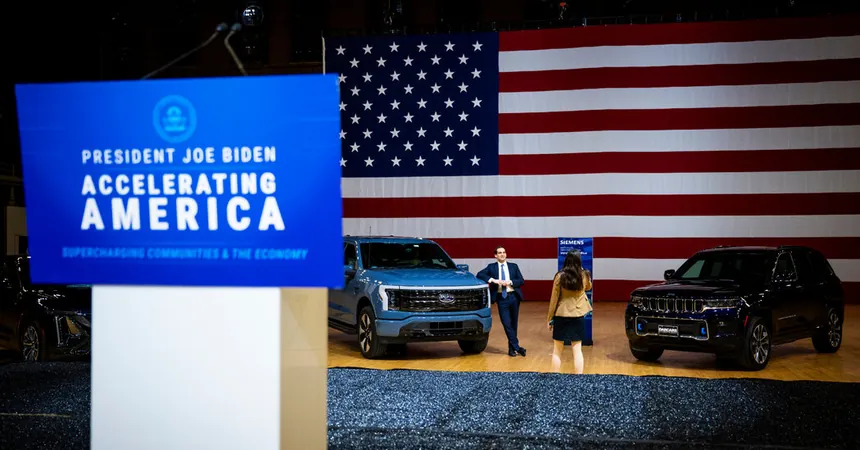
Automakers Plead with Trump: Keep Electric Vehicle Standards!
2024-11-22
Author: Jessica Wong
Automakers Urge Trump to Preserve EV Standards
In a surprising turn of events, three of the largest automakers in the United States—Ford, General Motors, and Stellantis—are rallying together to urge President-elect Donald J. Trump not to dismantle federal regulations that require the industry to promote electric vehicles (EVs). This delicate request comes against the backdrop of an administration that has been vocally critical of such environmental measures.
Importance of Emission Regulations
These regulations, which are crucial to reducing pollution and increasing fuel efficiency, have been championed by the Biden administration as vital steps in combating climate change. In stark contrast, Trump has often described these standards as limitations on consumers' freedom to choose the vehicles they aspire to drive, largely echoing sentiments from his oil industry backers.
Automakers' Investment and Concerns
Automakers find themselves in a precarious situation. Despite historically differing opinions on emissions regulations, most have already made substantial investments—over $146 billion in the last three years alone—toward transitioning to electric vehicles. They worry that scrapping these regulations entirely could lead to a surge in cheaper, gas-powered vehicles flooding the market, jeopardizing an industry that provides jobs for 1.1 million Americans.
Appeal for Stability
In a recent letter addressed to Trump, John Bozzella, president of the Alliance for Automotive Innovation—which represents 42 car manufacturers—emphasized the need for "stability and predictability" in emissions standards to ensure the competitiveness of the automotive industry. Fortunately for these automakers, there exists a silver lining: the regulations allow compliance through a mix of gas-powered cars, hybrids, and EVs.
Critical Time for EV Projections
The stakes are high, notably as the EPA projects that by 2032, about 56 percent of new passenger vehicles sold could be electric. However, if the incoming administration opts to roll back these measures, it could undermine the hard-earned progress toward sustainable energy within the automotive sector and risk massive financial losses for companies striving to comply with more stringent requirements.
Elon Musk's Role in Negotiations
Elon Musk, CEO of Tesla—which leads in U.S. EV sales—could play a pivotal role in discussions with Trump. Yet, his interests lean more heavily toward easing regulations for self-driving technology than preserving tax credits for EV buyers, a move that could result in a significant downturn for competitors like GM and Ford.
Potential Consequences of Tax Credit Elimination
In fact, analysts suggest that eliminating the $7,500 tax credit built into the 2022 Inflation Reduction Act could harm traditional automakers far more than it would Tesla. The potential fallout from this decision raises alarm bells, as most American auto manufacturers are still operating at a loss on their EV lines while urgently trying to scale production.
Navigating the Political Landscape
The automakers must tread carefully as past encounters with Trump have been fraught with tension. The president was particularly outraged when several leading automakers struck deals with California to meet more stringent emissions targets, a move seen as undermining his administration's deregulatory efforts. As the political landscape evolves, Ford and GM find themselves needing to repair relationships with Trump, who holds grudges against those he perceives as disloyal.
Global Competition and Future of the Industry
Automakers are fully aware that if they fail to adapt to the cleaner standards of the modern market, they risk being overtaken by international competitors from Europe and China, who are charging ahead in the EV revolution. Executives recognize that a coherent regulatory framework is paramount if American car companies are to maintain their edge in a rapidly changing global landscape.
A Crucial Crossroads for the Automotive Industry
Moving forward, the car manufacturers hope to plead their case with the new administration, demonstrating that many of their new EV manufacturing facilities are situated in Trump-supporting states, generating local jobs and investment. Ultimately, the automotive industry is at a crucial crossroads; the decisions made in the upcoming months could shape its future and influence the trajectory of American manufacturing for generations.
A Clear Message from the Automotive Sector
The message from the automotive sector is clear: "Don't dismantle, improve!" As the world turns its gaze toward a cleaner future, the outcome of this matter could either solidify the U.S. as a leader in electric vehicles or leave it lagging behind in a global race for sustainability.




 Brasil (PT)
Brasil (PT)
 Canada (EN)
Canada (EN)
 Chile (ES)
Chile (ES)
 España (ES)
España (ES)
 France (FR)
France (FR)
 Hong Kong (EN)
Hong Kong (EN)
 Italia (IT)
Italia (IT)
 日本 (JA)
日本 (JA)
 Magyarország (HU)
Magyarország (HU)
 Norge (NO)
Norge (NO)
 Polska (PL)
Polska (PL)
 Schweiz (DE)
Schweiz (DE)
 Singapore (EN)
Singapore (EN)
 Sverige (SV)
Sverige (SV)
 Suomi (FI)
Suomi (FI)
 Türkiye (TR)
Türkiye (TR)